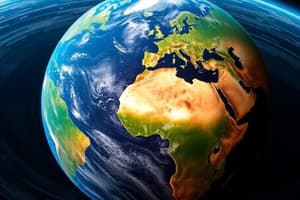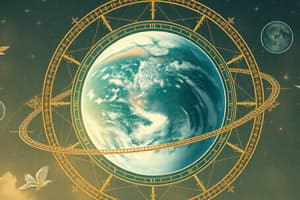Podcast
Questions and Answers
What shape is the Earth classified as?
What shape is the Earth classified as?
- Flat
- Cuboid
- Perfect sphere
- Oblate spheroid (correct)
The Earth's rotation takes approximately 24 hours to complete.
The Earth's rotation takes approximately 24 hours to complete.
True (A)
What are the four seasons experienced on Earth?
What are the four seasons experienced on Earth?
Spring, Summer, Autumn, Winter
The Earth's closest approach to the sun is known as _________.
The Earth's closest approach to the sun is known as _________.
Match the following terms with their descriptions:
Match the following terms with their descriptions:
How long does it take Earth to complete a revolution around the Sun?
How long does it take Earth to complete a revolution around the Sun?
The Earth's magnetic field protects living organisms from harmful solar radiation.
The Earth's magnetic field protects living organisms from harmful solar radiation.
What are the primary components of the Earth's structure?
What are the primary components of the Earth's structure?
What term describes the total solid Earth, including the crust and upper mantle?
What term describes the total solid Earth, including the crust and upper mantle?
During a solar eclipse, the Earth is positioned between the sun and the moon.
During a solar eclipse, the Earth is positioned between the sun and the moon.
What are the two main parts of the Earth's core?
What are the two main parts of the Earth's core?
The layer of gases that envelops the Earth is known as the __________.
The layer of gases that envelops the Earth is known as the __________.
Match the following components of the Earth with their descriptions:
Match the following components of the Earth with their descriptions:
What process involves water vapor in the air changing into a liquid?
What process involves water vapor in the air changing into a liquid?
Earth's atmosphere is composed of approximately 78% oxygen.
Earth's atmosphere is composed of approximately 78% oxygen.
What is the proportion of fresh water in the Earth's hydrosphere?
What is the proportion of fresh water in the Earth's hydrosphere?
Study Notes
Earth Overview
- Third planet from the Sun and the only planet known to support life.
- Approximately 4.6 billion years old.
- Located in the Orion-Cygnus arm of the Milky Way.
- Largest fifth planet in the solar system.
Characteristics of the Earth
- Shape: Oblate spheroid, slightly flattened at the poles and bulging at the equator.
- Rotation: Takes about 23 hours and 56 minutes to complete one full turn on its axis.
- Revolution: Earth orbits the Sun, completing one full cycle in approximately 365.25 days.
- Normal year: 365 days.
- Leap year: 366 days.
- Aphelion: Point in Earth's orbit when it is farthest from the Sun.
- Perihelion: Point in Earth's orbit when it is closest to the Sun.
Earth Seasons
- Spring (Vernal Equinox): Begins around March 20-21; day and night are approximately equal in length.
- Summer: Starts between June 20-22; Northern Hemisphere is directly exposed to the Sun, resulting in longer days.
- Autumn (Fall): Begins around September 22-23; the equator experiences direct sunlight.
- Winter: Starts around December 21-22 (North), June 22 (South); longest night occurs in the Northern Hemisphere.
- Equinoxes: Day and night are of equal length.
- Solstices: Represent the longest and shortest days of the year.
Magnetic Field of the Earth
- Earth acts as a giant magnet, essential for protecting life from harmful solar radiation.
- Responsible for phenomena like the auroras.
Earth's Moon
- Known as Luna, it is the only natural satellite of Earth.
- Perigee: Closest approach to Earth.
- Apogee: Farthest point from Earth.
Composition of the Earth
- Crust: Composed of lighter materials.
- Mantle: Contains silica with a high presence of metallic materials.
- Core:
- Inner core is solid.
- Outer core is liquid.
Solar and Lunar Eclipses
- Solar Eclipse: Occurs when the Moon is positioned between the Earth and the Sun.
- Umbra: Dark central region.
- Penumbra: Surrounding area of partial shadow.
- Lunar Eclipse: Occurs when Earth casts a shadow on the Moon, causing it to darken.
Earth's Subsystems
- Geosphere: Refers to the solid Earth, including the lithosphere.
- Comprises the crust and upper mantle; 46.6% oxygen in the crust.
- Hydrosphere: 70% of Earth is covered by water, with 3% being freshwater.
- 2/3 of freshwater is frozen; 1/3 exists as surface water or groundwater.
- Hydrologic Cycle: Includes evaporation, transpiration, condensation, precipitation, infiltration, and surface runoff.
- Atmosphere: A thin layer of gases surrounding Earth, primarily composed of nitrogen (78%), oxygen (21%), and argon (0.9%).
- Biosphere: Encompasses all living forms and decomposed organic matter.
Hydrologic Cycle Processes
- Evaporation: Water converts from liquid to vapor.
- Condensation: Water vapor changes back into liquid.
- Transpiration: Water vapor released from plants through stomata.
- Precipitation: Water falls from clouds in forms like rain or snow.
- Infiltration: Water soaks into the subsurface rocks and soil.
- Surface Runoff: Water flowing over the ground after rain or snowmelt.
Studying That Suits You
Use AI to generate personalized quizzes and flashcards to suit your learning preferences.
Description
This quiz explores fundamental characteristics of Earth, including its shape, motion, magnetic field, and seasons. Test your knowledge about Earth's unique features and its role in the solar system.



